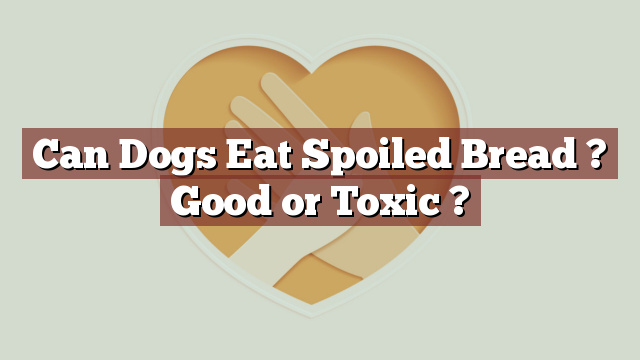Can Dogs Eat Spoiled Bread? Is it Safe or Toxic?
As responsible pet owners, it is crucial to be informed about the foods that are safe for our furry friends to consume. While dogs often have the tendency to beg for human food, it is essential to be aware of the potential risks associated with feeding them certain foods. One such food that may raise questions is spoiled bread. Is it safe for dogs to eat spoiled bread? Let’s delve into this topic and explore the nutritional value, potential risks, and benefits of dogs consuming spoiled bread.
Nutritional Value of Spoiled Bread for Dogs
Before we discuss the safety of dogs eating spoiled bread, let’s take a look at the nutritional value it holds. Bread is primarily composed of carbohydrates, which provide energy to both humans and dogs. It may also contain small amounts of protein, vitamins, and minerals, depending on the type of bread. However, it is worth noting that the nutritional value of bread significantly decreases as it spoils.
Can Dogs Eat Spoiled Bread? Is it Safe or Toxic?
No, it is generally not safe for dogs to eat spoiled bread. Consuming spoiled bread can lead to various health issues for our canine companions. Spoiled bread may contain mold or bacteria, which can cause gastrointestinal distress, such as vomiting and diarrhea, in dogs. Additionally, certain molds found on spoiled bread produce mycotoxins that are harmful to both humans and animals. These mycotoxins can potentially lead to more severe complications in dogs, including tremors, seizures, and even organ damage.
Veterinary experts strongly advise against feeding spoiled bread to dogs due to the potential risks it poses to their health. It is vital to prioritize their well-being and provide them with a balanced and nutritionally appropriate diet.
Potential Risks and Benefits of Dogs Eating Spoiled Bread
Feeding your dog spoiled bread may expose them to various risks. As mentioned earlier, the presence of mold or bacteria can lead to digestive issues and other health problems. Additionally, the mycotoxins produced by certain molds can have serious consequences for your dog’s health.
On the other hand, there are no significant benefits associated with dogs consuming spoiled bread. Dogs require a diet that is rich in nutrients and specifically formulated for their needs. There are numerous commercially available dog foods that provide a balanced combination of protein, carbohydrates, and essential vitamins and minerals. These foods are much safer and healthier for your furry friend than spoiled bread.
What to Do If Your Dog Eats Spoiled Bread
If you suspect that your dog has consumed spoiled bread, it is essential to monitor their behavior and look out for any signs of illness. If your dog exhibits symptoms such as vomiting, diarrhea, or any abnormal behavior, it is crucial to consult your veterinarian immediately. They will be able to provide the necessary guidance and treatment to ensure your dog’s well-being.
Conclusion: Considering the Risks, it’s Best to Avoid Feeding Dogs Spoiled Bread
In conclusion, feeding dogs spoiled bread is not recommended. The potential risks, such as gastrointestinal distress and exposure to harmful mycotoxins, outweigh any perceived benefits. It is essential to prioritize your dog’s health by providing them with a balanced and nutritionally appropriate diet. If you have any concerns about your dog’s diet or suspect they may have consumed spoiled bread, consult your veterinarian for proper guidance and care.
Thank you for investing your time in exploring [page_title] on Can-Eat.org. Our goal is to provide readers like you with thorough and reliable information about various dietary topics. Each article, including [page_title], stems from diligent research and a passion for understanding the nuances of our food choices. We believe that knowledge is a vital step towards making informed and healthy decisions. However, while "[page_title]" sheds light on its specific topic, it's crucial to remember that everyone's body reacts differently to foods and dietary changes. What might be beneficial for one person could have different effects on another. Before you consider integrating suggestions or insights from "[page_title]" into your diet, it's always wise to consult with a nutritionist or healthcare professional. Their specialized knowledge ensures that you're making choices best suited to your individual health needs. As you navigate [page_title], be mindful of potential allergies, intolerances, or unique dietary requirements you may have. No singular article can capture the vast diversity of human health, and individualized guidance is invaluable. The content provided in [page_title] serves as a general guide. It is not, by any means, a substitute for personalized medical or nutritional advice. Your health should always be the top priority, and professional guidance is the best path forward. In your journey towards a balanced and nutritious lifestyle, we hope that [page_title] serves as a helpful stepping stone. Remember, informed decisions lead to healthier outcomes. Thank you for trusting Can-Eat.org. Continue exploring, learning, and prioritizing your health. Cheers to a well-informed and healthier future!

